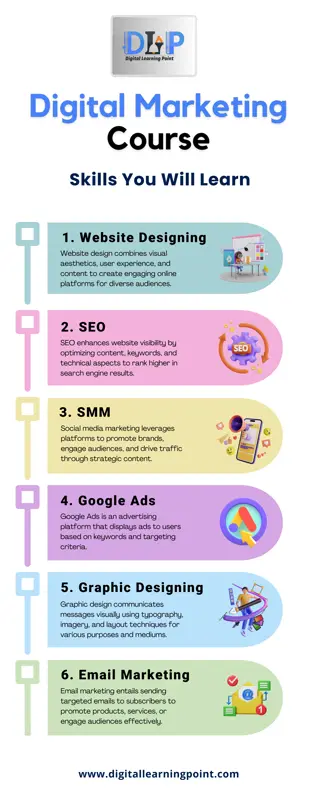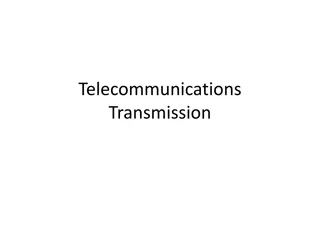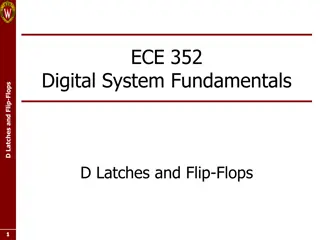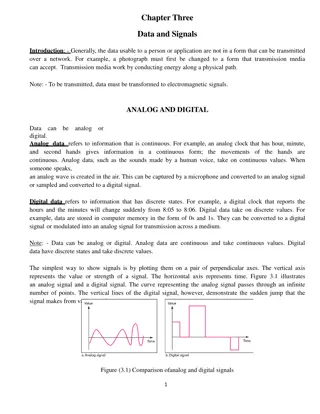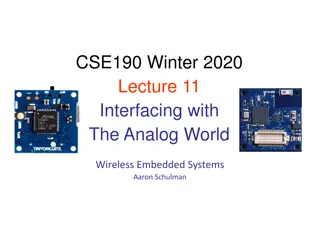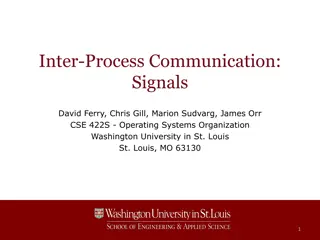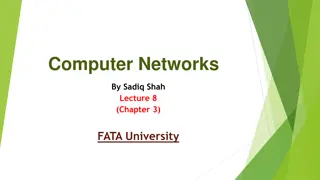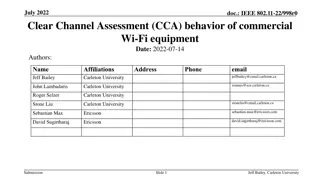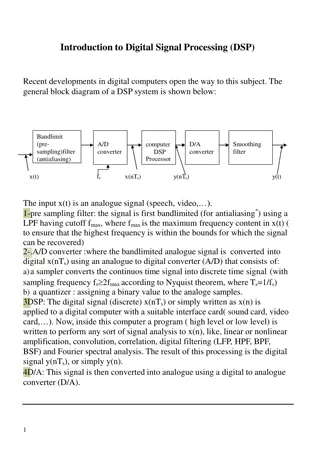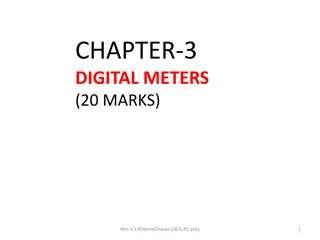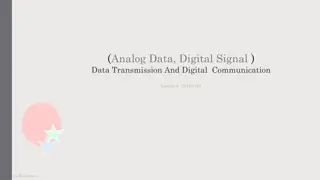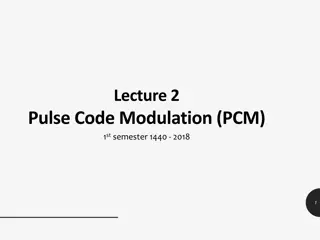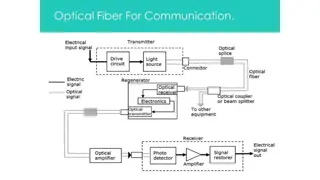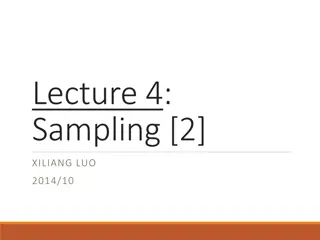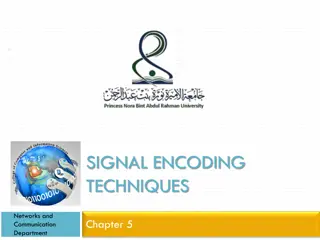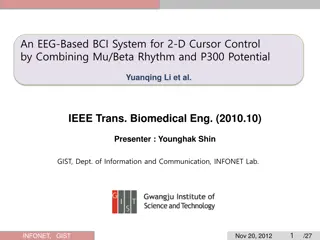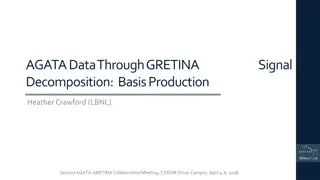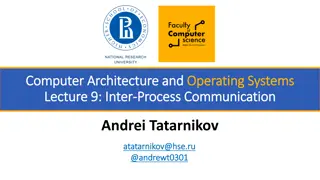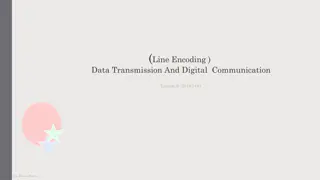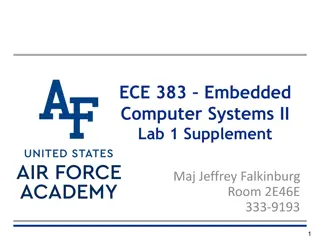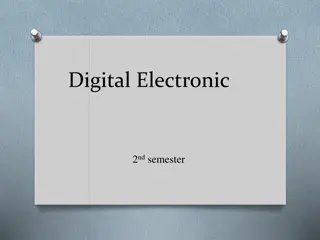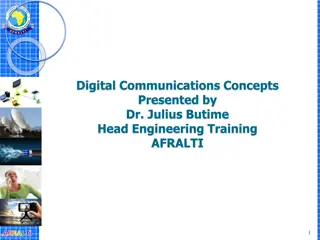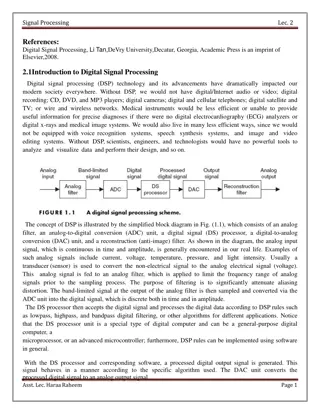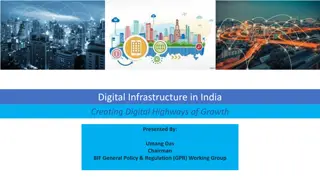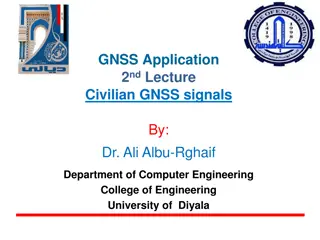Cognitive Load Classification with 2D-CNN Model in Mental Arithmetic Task
Cognitive load is crucial in assessing mental effort in tasks. This paper discusses using EEG signals and a 2D-CNN model to classify cognitive load during mental arithmetic tasks, aiming to optimize performance. EEG signals help evaluate mental workload, although they can be sensitive to noise. The
0 views • 19 slides
Digital Competency Maturity Model 2.0 for Accounting Firms - Overview and Implementation
The Digital Competency Maturity Model 2.0 (DCMM 2.0) is a framework designed to help professional accounting firms evaluate and enhance their digital competencies. Released as an upgrade to the previous version in 2017, DCMM 2.0 offers a structured approach for firms to assess their current level of
4 views • 19 slides
Understanding Data Acquisition and Instrument Interface
In the realm of data acquisition and instrument interface, various components come together to sense physical variables, condition electrical signals, convert analog to digital data, and analyze the acquired information. This process involves transducers, signal analysis, instrument automation, and
3 views • 54 slides
Understanding Digital Media: A Grade 3-5 Introductory Lesson on Digital Wellness
Explore the importance of digital wellness and learn how to maintain a balance between digital and face-to-face interactions. The lesson covers concepts of citizenship, etiquette, and safety in the digital world, along with exploring what digital media is and how it shapes our everyday lives. Activi
0 views • 11 slides
Empowering Communities with Discover Digital Project: A Guide to Digital Health and Wellbeing
Discover Digital Project aims to raise awareness of digital tools for health and wellbeing, offering training and resources to enhance digital literacy and access to healthcare services. The project includes grant schemes, roadshows, and workshops to empower communities and staff with the knowledge
9 views • 17 slides
Digital Learning Point
Digital Marketing is a profoundly unique field where procedures and patterns develop rapidly. Join Digital Learning Point for the best digital marketing course in Haldwani, and we will help you to know each and every aspect of Digital marketing.\n\nDigital marketing course in Haldwani | Digital mark
7 views • 1 slides
Understanding Telecommunications Transmission Systems
Transmission systems in telecommunications provide circuits between network nodes using channels for bidirectional communication. Channels can range from simple audio circuits to complex satellite systems. Signals can be analog or digital, each with its unique characteristics. Bandwidth is crucial f
0 views • 32 slides
Understanding D Latches and Flip-Flops in Digital Systems
Digital systems rely on storage elements like D latches and flip-flops to store key information from the past. These structures can hold values of 1 or 0 based on certain control signals, ensuring deterministic behavior. Clock signals are essential for regulating when these storage elements can upda
0 views • 15 slides
Understanding Data and Signals in Networks
Data transmission involves converting information into electromagnetic signals for communication. Analog data is continuous, like a clock's hands, while digital data is discrete, like binary code in computer memory. Signals can be analog or digital, periodic or non-periodic, with characteristics lik
0 views • 17 slides
Interfacing with Analog Signals in Embedded Systems
Exploring the conversion of analog signals from the physical world into electrical signals using transducers in embedded systems. Learn about going from analog to digital representation, choosing sample rates, the Shannon-Nyquist sampling theorem, importance of anti-aliasing filters, and the necessi
0 views • 18 slides
Understanding Inter-Process Communication Signals in Operating Systems
Signals in inter-process communication are asynchronous notifications delivered to specific processes, allowing event-based programming. Processes can handle signal delivery by ignoring it, terminating, or invoking a signal handler. Signal handlers can be written in two ways - one handler for many s
0 views • 21 slides
Understanding Bandwidth and Digital Signals in Computer Networks
Exploring the concept of bandwidth in computer networks, which refers to the range of frequencies in a signal, and delving into the decomposition of signals into simple sine waves using tools. Additionally, the discussion covers digital signals, their representation, and the transmission of informat
1 views • 14 slides
Clear Channel Assessment (CCA) Behavior of Commercial Wi-Fi Equipment
This document, dated July 2022, delves into the Clear Channel Assessment (CCA) behavior of commercial Wi-Fi equipment in response to Narrowband Frequency Hopping (NB FH) signals. It explores the regulatory framework around license-exempt frequency bands in the USA and Europe, highlighting the specif
0 views • 22 slides
Oxford Health Digital Health & Care Strategy Summary 2021-26
This summary outlines the key aspects of the Oxford Health Digital Health & Care Strategy 2021-26, which is crucial for the Trust strategy. It covers digital ambitions, strategic objectives, digital empowerment, improving access to digital alternatives, enhancing self-help and online care, digital c
0 views • 8 slides
Overview of Digital Signal Processing (DSP) Systems and Implementations
Recent advancements in digital computers have paved the way for Digital Signal Processing (DSP). The DSP system involves bandlimiting, A/D conversion, DSP processing, D/A conversion, and smoothing filtering. This system enables the conversion of analog signals to digital, processing using digital co
1 views • 24 slides
Understanding Digital Meters in Electronics
Digital meters are essential instruments in electronics for accurate measurement of signals and frequencies. They offer advantages like high accuracy, resolution, and portability compared to traditional analog instruments. Learn about the principles, functionality, and components of digital meters,
0 views • 18 slides
Understanding Analog Data and Digital Signal Transmission
This lecture delves into the concepts of analog data, digital signals, and the processes involved in data transmission and digital communication. It covers topics such as Pulse Amplitude Modulation (PAM), Analog-to-Digital Conversion, and Sampling. The conversion of analog signals to digital signals
0 views • 34 slides
Understanding Pulse Code Modulation (PCM) in Analog to Digital Conversion
This content delves into the realm of Pulse Code Modulation (PCM), outlining its significance in converting analog data to digital signals. It covers the process of Analog to Digital Conversion, emphasizing the advantages of digitizing analog signals for improved quality and reduced noise. The steps
0 views • 14 slides
Overview of Point-to-Point Fiber Optic Communication System
Point-to-point fiber optic communication systems involve converting voice signals from a microphone into digital signals using a coder, transmitting light signals through a semiconductor diode laser over optical fibers, and decoding the signals back to analog for sound production. The system offers
0 views • 11 slides
Digital Skills Pack March 2021 Overview
This document provides insights into the demand for digital skills in various industries, focusing on the West of England region. It analyzes digital career pathways, skills demanded, and labor market trends. The report highlights the growth of the Digital Sector, key skills for digital jobs, and wa
1 views • 39 slides
TV Ads Signalling Success: Driving Strong Fitness, Trust, and Popularity Signals
TV ads play a crucial role in signaling success by driving strong fitness, social, trust, quality, confidence, and popularity signals among adults. The strength of these signals varies across different media channels, with television emerging as a powerful platform for engaging audiences. Fitness an
15 views • 14 slides
Understanding Sampling and Signal Processing Fundamentals
Sampling plays a crucial role in converting continuous-time signals into discrete-time signals for processing. This lecture covers periodic sampling, ideal sampling, Fourier transforms, Nyquist-Shannon sampling, and the processing of band-limited signals. It delves into the relationship between peri
1 views • 60 slides
Signal Encoding Techniques in Networks and Communication
This chapter delves into signal encoding techniques used in digital data transmission, covering key concepts such as encoding schemes like NRZ-L and NRZI, multilevel binary encoding, and biphase encoding. It explores the fundamentals of digital signaling, modulation techniques, and the relationship
3 views • 34 slides
Understanding Fly-By-Wire (FBW) Systems in Aircraft
Fly-By-Wire (FBW) is a revolutionary system that replaces traditional manual flight controls with electronic interfaces in aircraft, enhancing safety and performance. It converts pilot inputs into electronic signals, allowing for automatic functions and precise control. This system involves complex
2 views • 5 slides
Deconvolving Snow Cover and Snowfall Passive Microwave Signals
This research focuses on deconvolving snow cover and snowfall passive microwave signals using GPM data. The study employs a data-driven approach to estimate snowfall using a nested K-nearest algorithm and observed irregularities. By analyzing variations in brightness temperatures (Tbs) over snow-cov
0 views • 9 slides
EEG-Based BCI System for 2-D Cursor Control Combining Mu/Beta Rhythm and P300 Potential
Brain-computer interfaces (BCIs) offer a pathway to translate brain activities into computer control signals. This paper presents a novel approach for 2-D cursor control using EEG signals, combining the Mu/Beta rhythm and P300 potential. By simultaneously detecting two brain signals, P300 and motor
0 views • 27 slides
Effective Strategies for Locational Signals in Renewable Energy Projects
Locational signals play a crucial role in steering renewable energy project constructions to specific areas, aiding in grid optimization and resource utilization. Strategies like bid bonuses, penalties, and maximum capacity quotas help manage integration challenges and ensure sustainable deployment
0 views • 17 slides
Basis Production Procedure for AGATA through GRETINA Signal Decomposition
This presentation outlines the detailed procedure for generating basis signals in the context of AGATA data processed through GRETINA signal decomposition. It covers the generation of pristine basis signals, superpulse analysis, and the creation of cross-talk corrected basis files. The process invol
0 views • 19 slides
Understanding Inter-Process Communication in Computer Architecture
Explore the key concepts of Inter-Process Communication (IPC) in computer architecture, covering topics such as signals, message queues, shared memory, and handling signals. Learn how to send and handle signals, manage never-ending programs, and control processes using utilities like kill. Dive into
0 views • 20 slides
Introduction to Line Coding and Digital Signal Transmission
Line coding is the process of converting binary data into digital signals, essential for digital transmission. Unipolar and polar encodings are discussed, highlighting the use of voltage levels to represent data. Digital signals, offering noise immunity and data compression, are crucial for efficien
0 views • 22 slides
Embedded Computer Systems Lab 1: VGA Module Overview
This document provides an overview of Lab 1 for Embedded Computer Systems II, focusing on the VGA module and its functionalities. It includes details about the VGA module entity, its ports, clock signals, trigger voltage and time representation, channel signals, color intensities, row and column val
0 views • 18 slides
Volleyball Referee Hand Signals for Common Violations
Learn the essential hand signals used by volleyball referees to indicate common violations during a game. Signals include illegal alignment, line violation, illegal hit, delay of service, over the net, net foul, legal back row attack, illegal attack of serve back row attack, and illegal block/screen
0 views • 26 slides
Impact of Digital Communication on Social Inequality
The impact of digital forms of communication in a global context highlights the existence of a digital divide based on social inequality, particularly regarding access to information and communication technologies. This digital gap is evident within countries like the UK, where disparities exist bet
2 views • 12 slides
Overview of Communication Systems: Signal vs. Noise
Communication systems involve a battle between signal and noise/distortion, with information represented in analog or digital form. Analog signals include speech, music, and temperature readings, while digital signals can represent text and computer data. The history of analog and digital messages,
0 views • 17 slides
Introduction to Digital Electronic Circuits and Logic Gates
Understanding digital electronic circuits and logic gates is essential for building digital systems. This content covers the basics of logic gates, digital signals, and the practical application of binary digits in circuits. It discusses the function and importance of logic gates, such as NOT gates
0 views • 17 slides
Understanding Inter-Process Communication Signals in Operating Systems
Signals in operating systems play a critical role in facilitating asynchronous notifications between processes. They allow for event-based programming and are conceptually similar to hardware interrupts and exceptions. Processes can handle signal delivery by ignoring it, terminating, or invoking a s
0 views • 24 slides
Understanding Analog and Digital Communications Concepts
Exploring the differences between analogue and digital signals, this content presents a comprehensive overview. It covers the definitions of analog, the prevalence of analog signals in our surroundings, and the advantages of digital communication such as error correction, encryption, and data proces
0 views • 13 slides
Understanding Digital Signal Processing in Modern Society
Digital Signal Processing (DSP) technology has revolutionized modern society by enabling advancements in areas such as audio, video, communication, medical diagnostics, image processing, and data analysis. This technology involves converting analog signals to digital, applying digital algorithms for
0 views • 4 slides
Digital Infrastructure in India: Creating Pathways for Economic Growth
Digital infrastructure in India plays a crucial role in driving economic growth and development. The focus on creating a national digital grid and catalyzing investments in digital infrastructure is essential for the country's digital transformation. Improving digital infrastructure can unlock signi
12 views • 10 slides
Civilian GNSS Signals Overview: GPS, GLONASS, Galileo
An insightful lecture on civilian GNSS signals by Dr. Ali Albu-Rghaif covers GPS, GLONASS, and Galileo signals. The content delves into GPS signal modulation, generation, receiving, and demodulation processes, highlighting the carrier wave, navigation data, and spreading sequences. It also discusses
0 views • 20 slides





